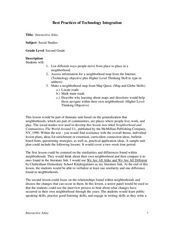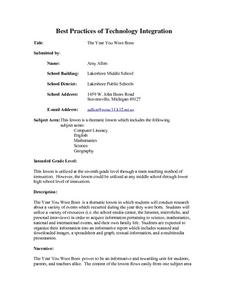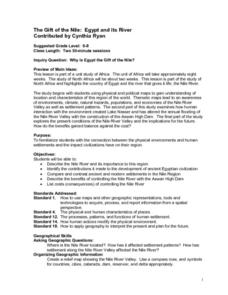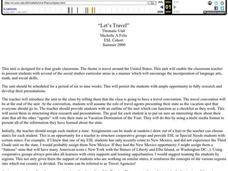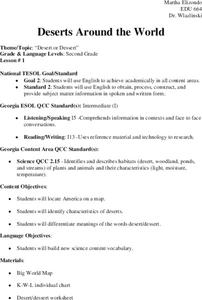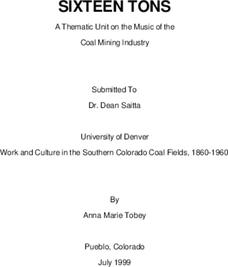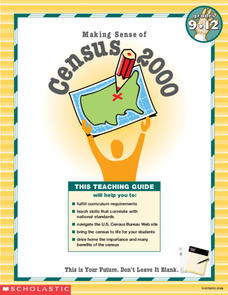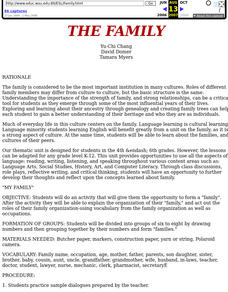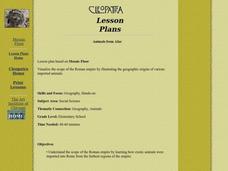Curated OER
The Industrial Revolution
Tenth graders explore the impact of the Industrial Revolution. In this Industrialization lesson, 10th graders take notes on a SMART Board presentation and conduct research on urbanization, enclosure, assembly lines, boarding houses, and...
Curated OER
National and Regional Identity
Learners examine state quarters to identify symbols that represent national and regional identity. They discuss the process used to determine what is put on the quarter. They review colonial money, and euros to look for cultural images.
Curated OER
BEGINNER LEVEL LESSON PLAN ANTICIPATORY SET
Students are be able to analyze primary sources for evidence of American entrepreneurship during the early 20th century. They identify the attributes that helped George Eastman succeed as an entrepreneur and consider the role advertising...
Curated OER
The Rise of U.S. Business and Industry
Eleventh graders examine the industrialization of post-Reconstruction America. In this 20th century American history lesson, 11th graders listen to a lecture about the industrial age and then conduct their own research to determine the...
Curated OER
BEGINNER LEVEL LESSON PLAN
Students are be able to analyze primary sources (photographs) for evidence of Native American culture and construct a cultural symbol. They are explained what the stars and stripes stand for on the American flag. Students work as...
Curated OER
A World of Money
Students explore the traditions related to the creation of national currencies. The role currency plays in shaping a national or regional identity and the influences that the designers of world currency exert are examined in this lesson.
Curated OER
On the Road Again
Students examine migration patterns in Africa and China. They watch excerpts from a documentary, define key vocabulary words, complete various student organizers, and create a poster.
Curated OER
Interactive Atlas
Second graders examine the different ways people move from place to place in a neighborhood. Using the interactive online atlas MapQuest, they identify the various ways people move around their own neighborhood by creating a map and...
Curated OER
The Mayflower Compact
Fourth graders explore the events leading up to the Mayflower Compact. In this government lesson, 4th graders have a teacher-led class discussion on the importance of government, then complete a worksheet on the topic.
Curated OER
The Year You Were Born
Students research a variety of events that occurred during the year they were born. They conduct Internet research, conduct interviews, and organize their research information into a report using HyperStudio.
Curated OER
The Gift of the Nile: Egypt and its River
Students begin with a piece of a puzzle that shows an artifact from ancient Egypt. They find others who have pieces that go with their puzzle piece. Students work in these groups to construct a relief map of the Nile River Valley.
Curated OER
Exploring Arizona's Biotic Communities Lesson 1: Mapping Biotic Communities
As part of a unit on Arizona's biotic communities, young ecology learners create a map. They describe how humans and animals adapt in their habitat. They take notes and create graphic organizers from articles they read. Beautiful maps,...
University of New Mexico
Let's Travel
Fourth graders work in groups to research various locations across the United States. They present their findings to the class, participate in a travel fair, make phone calls to tourist agencies and write letters to state tourism...
Curated OER
Discover the World of Machines
Pupils participate in a project which incorporates science with reading, writing, social studies, and technology. Through several activities over a 15 day period, they explore the computer, digital camera, computer software programs and...
Curated OER
Deserts Around the World
Second graders explore the deserts around the world. They use a map and locate America on the map. Students discuss and identify the characteristics of deserts and differentiate the meanings of the word desert and dessert. Students...
Curated OER
Editing
Fourth graders edit their previously written essay rough drafts with a partner in this lesson. They apply the revision process using a revision checklist, then revise independently. They conference with the teacher about their needed...
Curated OER
SIXTEEN TONS
Students explore a variety of music related to the coal mining industry and organized labor which can be integrated into the study of Colorado History, American Labor History, and a study of immigration.
Curated OER
Making Sense of the Census
For this unit of lessons, students make sense of the census. They examine why a census is taken and partipate in activities.
Curated OER
The Family
Young scholars investigate family organization and create a family unit. They decide the relationships, make ID's, and makes a family tree. They introduce their family units to the others in the class while the teacher takes family...
Curated OER
Native Americans at Rose Bay
Pupils examine the Timken Native Americans of the 1400s and their culture of hunter-gatherers. They study the necessary vocabulary using a number of activities.
Curated OER
Tooling Around Arizona: Reading Arizona Maps
Students study geography. In this Arizona maps lesson, students develop their map reading skills. They have class discussions and work independently with various copies of Arizona maps to practice those skills. This lesson mentions...
Curated OER
Animals from Afar
Pupils visualize the scope of the Roman empire by illustrating the geographic origins of various imported animals. They study how exotic animals were imported into Rome from the farthest regions of the empire.
Curated OER
One World
Students explore the urban socioeconomic and political problems in the US that caused hip hop to emerge in the 70's and 80's. Hip Hop culture is explored and related to the genre of art form.
Curated OER
The High Cost of Chemical Dependency
Sixth graders explore, analyze and study the effect and impact that humans have on the environment based on their choices as individuals, businesses and governments. They assess the balance between human activities and aquatic pollution.









